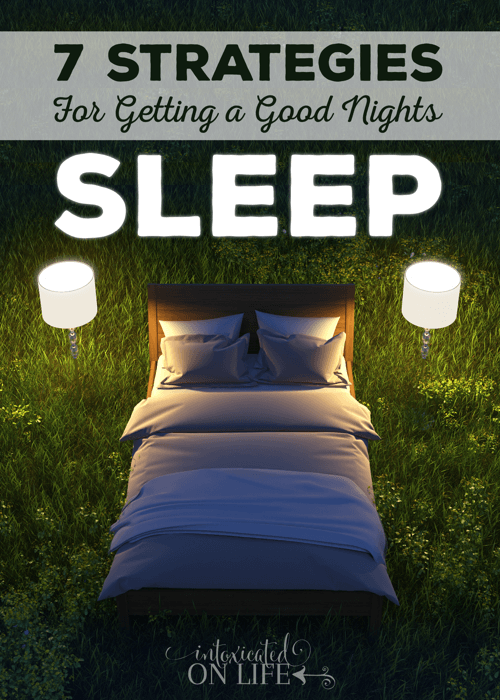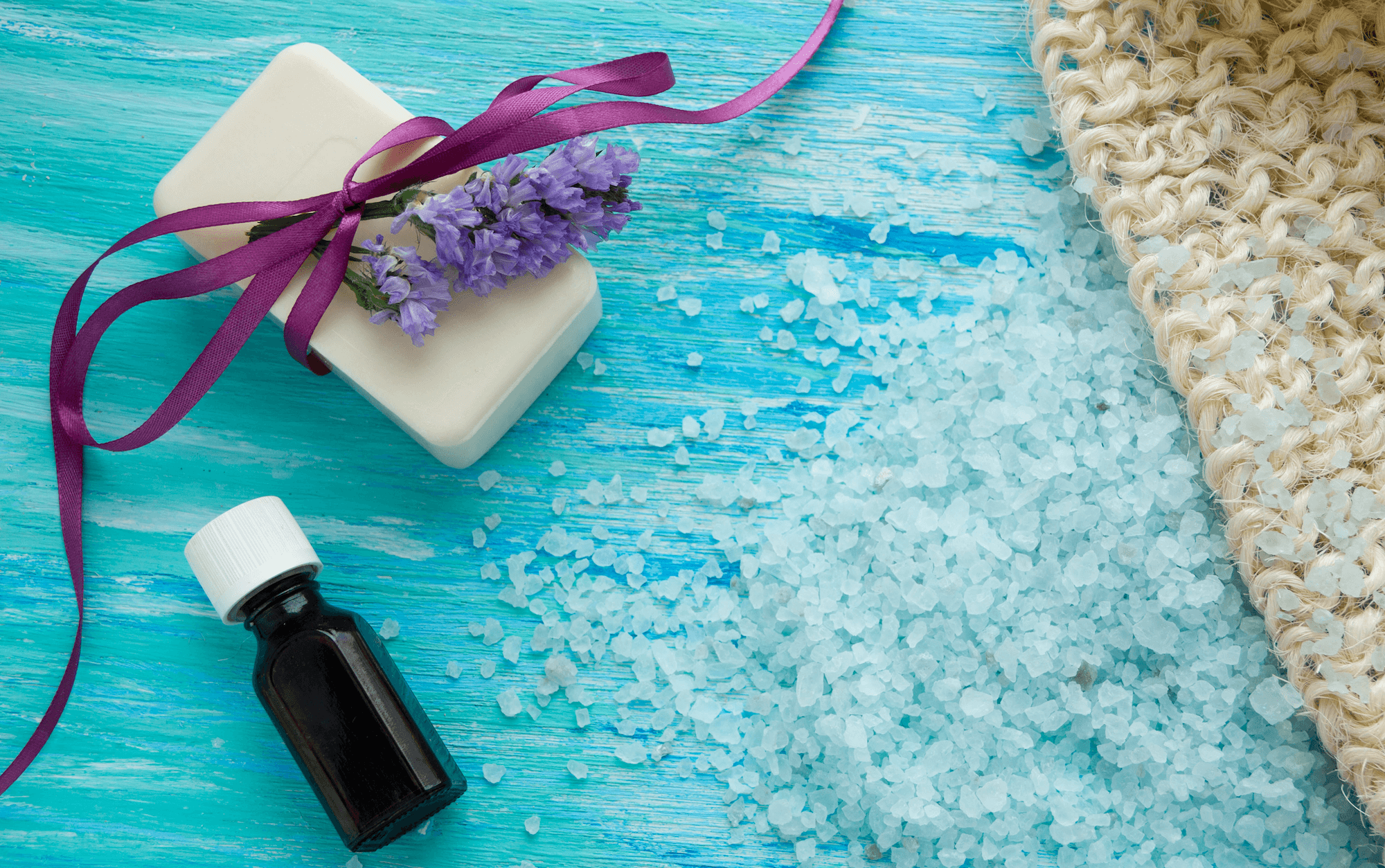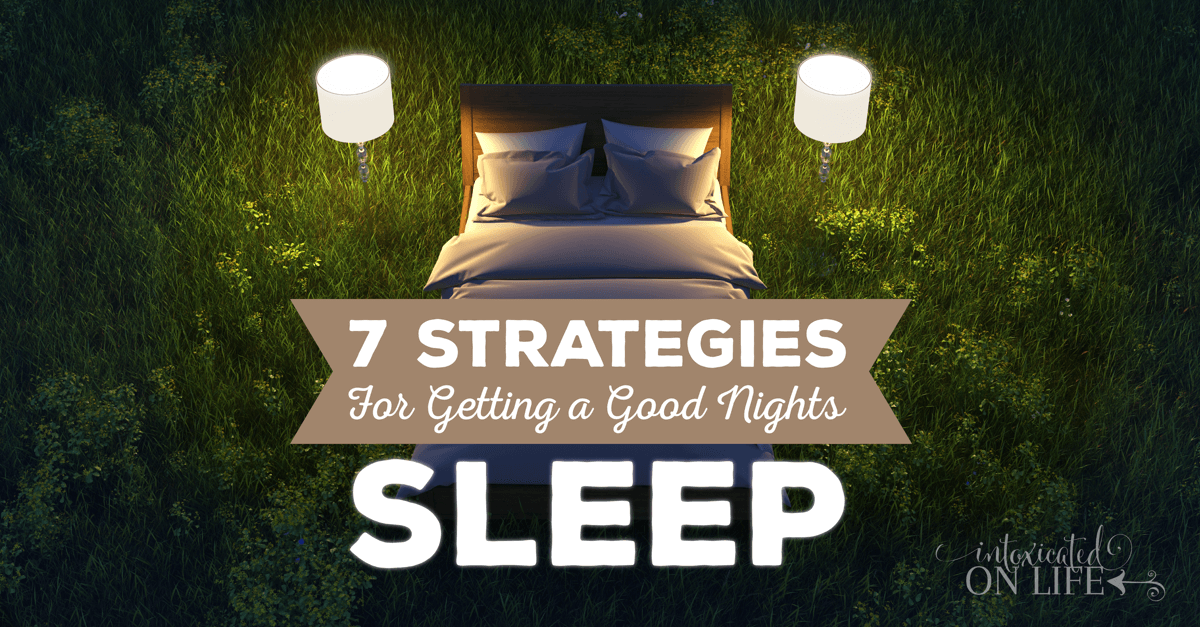I don’t have trouble sleeping at night. In fact, I have the opposite problem—I have trouble waking up! I could sleep an absolutely absurd number of hours. So you might be wondering, what qualifies me to write a post on strategies for a better night’s sleep?
While I don’t have trouble sleeping, I do have some extended family members who do, and I tend to be the person they come to for advice. They’ll say, “Hey, could you do some research for me on {fill in the blank},” and of course, being the total geek I am, I always oblige.
So, let’s talk about strategies for a better night’s sleep, according to the research…
7 Sleep Strategies for Sleep You May Not Know About
We’re not going to cover some of, what I like to call, the “no duh” strategies. There are tons of articles floating around the Internet without those—you know, napping too close to bedtime, keeping a normal sleep/wake routine, etc. I want to focus on some strategies you might not be aware of.
1. Eliminate the Blue Light at Night
This may be the single most difficult strategy in the list. Living in a modern world with modern conveniences is nice. But all those new fangled inventions like the lightbulb and electricity can wreck havoc on your sleep cycles.
You see, back in the days before electricity, you didn’t stay up too much later than the sun unless you wanted to burn through lots of candles. And you woke with the sun. Nowadays, we have electricity…and cell phones…and computers…and alarm clocks.
While I enjoy these modern conveniences as much as the next person, they don’t do us any favors in terms of sleep. One of the best things you can do to get better sleep at night is to eliminate “blue light” (which is part of the visible light spectrum).
How do you do this? Here are a few ideas…
- Avoid light from computers, tablets, and cell phones. They are some of the worst offenders. Simply turn off your computer or utilize an app called f.lux which will eliminate most blue light emitted from your computer.
- Another handy strategy is to purchase some blue-light blocking glasses. Wear these after the sun goes down to be able to stay up without worrying about the blue light messing with your circadian rhythms.
- If you live in the city, consider purchasing shades or curtains that block light (from streetlights, etc.) from coming in your windows.
- Purchase a few red-light night lights if you need some light after dark.
This might be the most difficult strategy but also the one that pays off the biggest for you. Don’t worry: the strategies after this get easier!
2. Expose Your Body to Sunlight in the Morning
Blue light isn’t great for you at night, but it is in the morning. Exposing your body to sunlight first thing in the morning will also help get your body adjusted to a natural circadian rhythm (your body’s natural synchronization with the sun cycle). Not only will it help you be more alert in the morning, but it will also help your body become more naturally in tune with light/dark cycles which will help you fall to sleep better at night.
Those of us living the the northern part of the US with very long and very cold winters may have a hard time getting outside first thing in the morning. If this you, you might benefit from a light box. An added bonus to using this during the winter months is it can help with those winter blues!
3. Proper mattress that supports you
Finding a proper mattress may not seem like it’s that difficult. Just lay on the mattress and make sure it’s comfortable, right? Wrong.
The average person tosses and turns approximately 20 times per night. Yikes! Every time that happens, this interrupts your body’s natural sleep cycle. Finding a mattress that decreases the need to toss and turn is important (as is a mattress that doesn’t expose you to massive amounts of toxins).
When we got our new mattress, an Organix Bed, I was astounded at how much more refreshing my sleep was. Not only that, but I didn’t wake up in the mornings with sore hips.
While you may not be fully waking up at night, you might not realize how interrupted your sleep cycles are from a mattress that does not fully support your body and give you pressure point relief.
4. Increase your magnesium.
Most of us don’t get near enough magnesium. Magnesium has a huge number of health benefits. And if you’re not getting enough, it can wreck havoc on your health in ways you may not even know.
If you’re suffering from sleepless nights, an easy thing to do is increase your magnesium. Magnesium is a natural muscle relaxant. You’ll be surprised how sleepy you become after adding magnesium to your evening routine.
You’ll want to be sure you’re getting plenty of magnesium in your diet and most people (approximately 75% of them, according to the World Health Organization) need to also supplement to get the right amount of magnesium each day.
You can easily add magnesium to your nightly routine. Take a magnesium supplement, or better yet — a magnesium lotion! The best way to get magnesium is through your skin. Yes, it’s better and even easier than popping a pill. Lotion won’t upset your stomach, like some magnesium supplements do. And magnesium absorbs through your skin into your bloodstream. Using magnesium lotion, is a highly effective way to get your daily dose of mag.
Read more about symptoms of magnesium deficiency here. Grab my fave magnesium lotion here.
5. Turn down your thermostat!
The optimal temperature for sleep is 60-65 degrees. That sounds downright chilly, doesn’t it? When you go to sleep, your brain loves the cooler temperatures!
A drop in your core temperature triggers your body to go to sleep. Of course, you don’t want to be so cold that you’re shivering, but try nudging the thermostat down a degree or two every night until you find a temperature that’s as low as you can go without being uncomfortable.
6. Use Essential Oils
You might be a skeptic of essential oils, but when it comes to sleep there are a number of studies that confirm the efficacy of using lavender essential oils to help with difficulty in sleeping.
One such study was completed by psychologists at Wesleyan University. They asked subjects to sniff lavender essential oil one night and then distilled water the next night. They monitored their sleep cycles with brain scans and found that the subjects slept more soundly when using the lavender oil. The subjects also reported feeling more energetic the morning after using the lavender essential oil.
Consider using lavender in a diffuser next to your bed, spritzing your pillows with a lavender and water mix, or rubbing a bit of diluted lavender oil on the back of your neck before bed.
7. Warm Bath
While this might be counter-intuitive given the fact that cool temperatures trigger your body to get ready for sleep, it really does work! While a warm bath will heat you up, when you hop out of the bath your body will cool down very quickly. This will mimic the natural drop in body temperature your brain causes that gets your body ready for sleep.
Bonus! You can also incorporate the use of Epsom salts and essential oils in your bath. Check out this post: DIY Relaxing Bath Salt Recipe.














My dog had a bad reaction to lavender, do you know of a safer oil for dogs to diffuse at bed time? The lavender was really helping at first, but then he started getting really weird until I stopped and he was back to normal.
You could also try chamomile essential oil.
Great tips! I think most of my trouble sleeping is kids waking me up, but some nights they sleep well and I need help. I will keep these tips in mind for those nights!
This post is awesome. Good for you for not have sleep issues, although if you are having a hard time waking you may be moving toward adrenal issues because you don’t have enough cortisol to wake you up. Thanks for sharing on Let’s Get Real Friday Link Party.